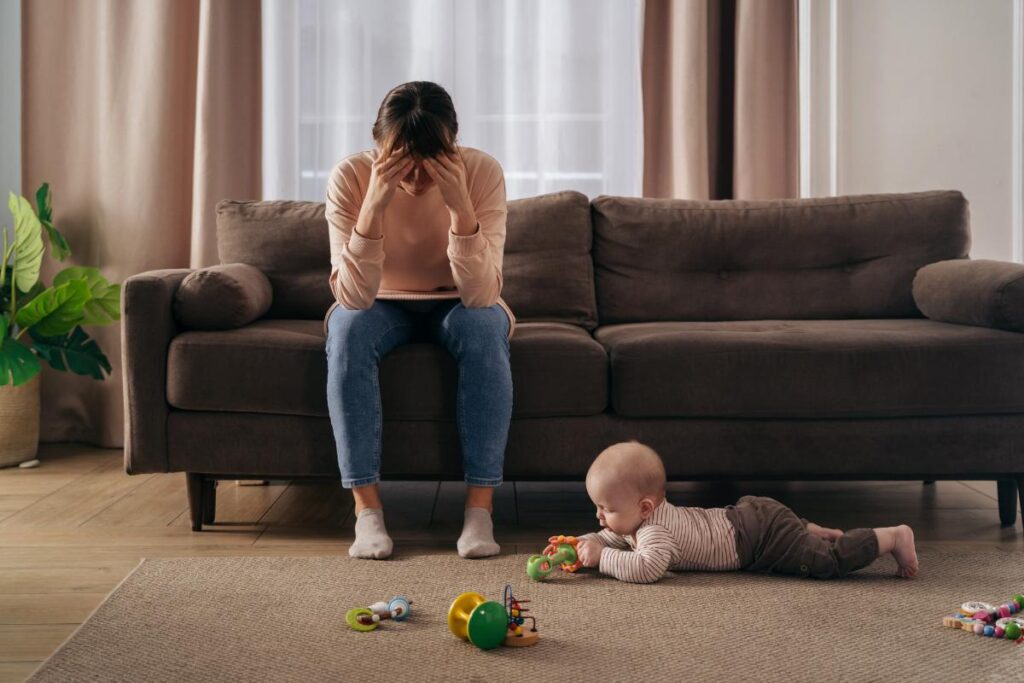Postpartum depression is more than just “baby blues.” It includes symptoms that last longer and are more intense than normal postpartum mood changes. Symptoms can range from mild to severe, from immense sadness to difficulty bonding with the baby.
Finding help for postpartum depression is vital. At the Recovery Ranch depression treatment center, we have experienced professionals who understand the unique challenges of postpartum depression and can help you develop healthy coping skills. Our experts create individualized treatment plans that draw on various therapies, such as cognitive-behavioral therapy, family counseling, and lifestyle changes. Find the help you need today by calling 1.844.876.7680.
Is Depression Hereditary for Everyone?
If your parents struggle with depression, you might wonder if you will develop depressive symptoms or are more likely to develop postpartum depression. While you share genes with your parents, it is not a guarantee you will develop depression. Very few outcomes are guaranteed based on your parents’ genetic makeup.
Furthermore, the genes that affect one’s risk for depression are numerous. Some genes control how much serotonin is produced and how many serotonin receptors are available. The same is true for every other chemical responsible for mood regulation. If you have siblings, take a moment to think about all the things you have in common and all the things that make you different. Maybe you need prescription glasses, but your sister has perfect vision. This is just one example of how different outcomes can stem from the same gene pool.
Genetics of Postpartum Depression
The symptoms of postpartum depression become apparent shortly after giving birth. Knowing if postpartum depression is hereditary can actually help women prepare for the time following the birth of their child. If your mother reports having postpartum depression, as well as your sister, your aunt, your grandmother, your cousin, or other family members, and if they share similar stories, chances are you will also be affected by postpartum depression.
Even if no woman in your family reports postpartum depression, that doesn’t mean you are totally in the clear. Depression is not controlled purely by genetics; environmental factors also play a role. For example, a traumatic birth experience can potentially lead to postpartum depression. Know the risk factors and the signs so you can get help as soon as possible. Risk factors include:
- Family history of postpartum depression
- Personal history of any type of depression
- Stressful events that occurred during pregnancy
- Difficulty breastfeeding
- Unwanted pregnancy
- Baby born with health problems
- Relationship problems with significant other
- Weak support system
- Financial strain
Signs of Postpartum Depression
Knowing how to recognize the signs of postpartum depression is essential to getting the help you need as soon as possible. Signs of postpartum depression can range from mild to severe and may include:
- Difficulty bonding with baby
- Social isolation or withdrawal
- Excessive crying
- Anxiety or panic attacks
- Thoughts of harming yourself or your baby
- Thoughts of suicide or death
- Feeling worthless, guilty, or ashamed
- Sudden changes in appetite
- Sudden changes in sleep patterns
- Anger and irritability
- Poor concentration
Postpartum depression affects nearly 15% of all women who give birth and can last for months if left untreated. Know that help is available and that you are not alone if you are experiencing signs of postpartum depression.
Depression Help at Recovery Ranch Tennessee
Recovery Ranch Tennessee is a residential treatment center that offers comprehensive care for individuals struggling with depression. We develop personalized treatment plans that include a variety of therapies, including evidence-based, holistic, and experiential treatments. We provide the help you need to get your life back on track.
If you are struggling with postpartum depression, please contact us today by calling 1.844.876.7680 to learn more about our programs and how we can help you.

